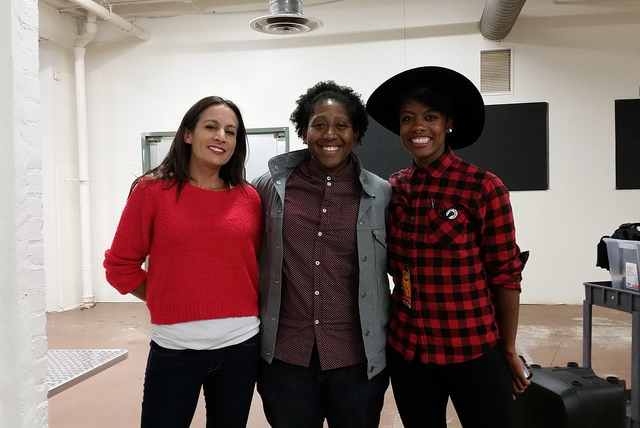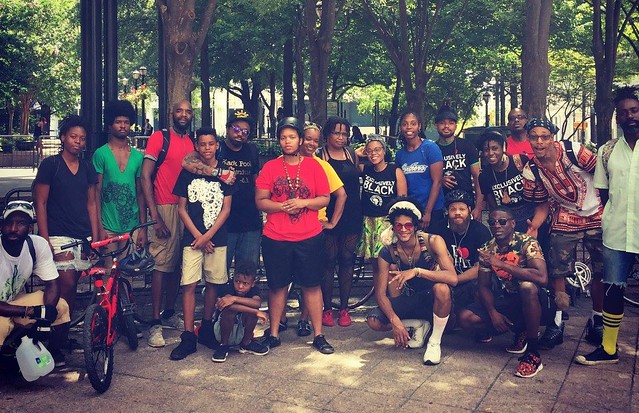Editor's note: Streetsblog Chicago sent writer Jean Khut to Atlanta last month to report on The Untokening and share lessons from the event that could be applied to transportation justice efforts in our city. We'll be running another post on the main Untokening activities in the near future.
In early November, mobility advocates from across the United States gathered in Atlanta for The Untokening, a "convening" to address equity issues in transportation and public spaces. The event was an extension of this year’s Facing Race Conference, held in Atlanta earlier that weekend.
In conjunction with the convening, The Untokening and the Atlanta Bicycle Coalition hosted a panel discussion called "LA X ATL Exchange: Race, Place & Justice," featuring Tamika Butler, director of the Los Angeles County Bicycle Coalition, and Zahra Alabanza, co-founder of the Atlanta chapter of Red, Bike, and Green. Sahra Sulaiman, a communities editor at Los Angeles Streetsblog, served as the moderator.
Walking, biking, and transit advocacy groups often struggle with how to define equity in their work. During the panel Butler said some bike advocates she knew felt there weren’t enough voices representing people who’ve been marginalized by systemic prejudices.
Since starting her position at the LACBC in 2014, Butler has become one of the most prominent voices promoting equity in active transportation. She grew up in Omaha and previously worked as a civil rights lawyer. Butler wasn’t into biking until a friend convinced her to do AIDS/Lifecycle, a fundraising bike ride from San Francisco to L.A. It was there where she met her wife Kelly and found her passion for bikes.
Butler said she has dealt with her share of of racism and sexism in the bike world. One common criticism she gets is that she isn’t “bikey” enough to lead an advocacy organization, which begs the question of what this term actually means. Are her critics saying she isn’t riding her bike enough for transportation and/or recreation to be a bike advocate? Butler doesn’t know the answer, but feels that she wouldn’t face the same criticism if she were a white male.
Likewise, Alabanza didn't fit the profile many other Atlanta bike advocates were used to. She moved to the city fifteen years ago with a background in community organizing, focusing on LGBTQ issues and reproductive rights. Eventually, her interest in social justice and biking intersected. She saw the need to create spaces for people of color to use biking as a way to form relationships and build community.
RBG originated in Oakland, California in 2007, and Alabanza co-founded the Atlanta chapter in 2012. At first many in the Atlanta bike scene didn’t know what to make of RGB and were surprised that they didn’t address some of the issues bike advocacy groups have traditionally focused on, such as promoting bike lanes and helmets. The volunteer-run group, which describes itself as "exclusively Black," uses biking a way to address economic, environmental, and mental and physical health issues that impact African-American communities.
Alabanza said her work with RBG allows her to be "unapologetically Black." Even though she helped create a positive, empowering space for African-Americans, she has faced some backlash, especially during the group’s first year. Alabanza has been accused of reverse racism from people who didn’t understand the need for an all-Black space.
Butler said she also deals with this struggle when trying to discuss equity issues in a predominately white space. Her approach to helping people understand what she’s saying is to try to put them at ease, because if she’s aggressive in her approach, some people perceive her as being racist.
"Just because I’m talking about something, it makes people uncomfortable," Butler said. "Their least common denominator is ‘she must hate us, because she wants to threaten our status quo, and she wants to threaten our power.'"
In mobility advocacy, advocates and allies should acknowledge and understand systemic issues of race, gender, and class, especially in spaces that are predominately white, male, and affluent. Building a coalition of people and organizations from diverse backgrounds is a start. However, coalition work varies in different communities.
Questions that should be asked include: How does one find balance in building a broader coalition? Who does the coalition actually represent? and How can organizations engage people who don’t have the luxury to do the advocacy work?
“Coalition [means] bringing multiple issues to the table,” said Alabanza, who believes that addressing all injustices in housing, education, transportation, and healthcare and seeing how they intersect are vital for building a solid coalition.
Alabanza said that when she first began doing bike advocacy, other Atlanta advocates saw her as unapproachable because RGB was different than other local bike groups. But eventually mainstream advocates began approaching her for input, especially when equity became a hot-button issue in transportation advocacy. As one of the few African-American consulted, she began to feel tokenized. She says solidarity is more than just having one person from a marginalized group at the table.
Many advocates of color deal with the same issue: They often find themselves being the sole representative of an entire race. When doing transportation advocacy work, it's important to think about how to bring marginalized communities together and to discuss how the work relates to them without anyone feeling like they are being forced to serve as the only spokesperson for their group.
Butler acknowledged that it's better be a token representative of a marginalized community than for there to be no one from your group at the table at all. Even if you're tokenized, it’s an opportunity to highlight the work other advocates are doing in your community. If there isn’t anyone talking about it, that advocacy work would never be discussed.
Advocates of color whose work isn’t recognized often create their own spaces in the mobility world, but how can advocacy organizations with more resources build a support system for them? It’s about collaborating and creating partnerships where local advocates can continue to do the work they do and larger organizations can factor in this work to expand their own mission.
![]()
Did you appreciate this post? Consider making a donation through our PublicGood site.







